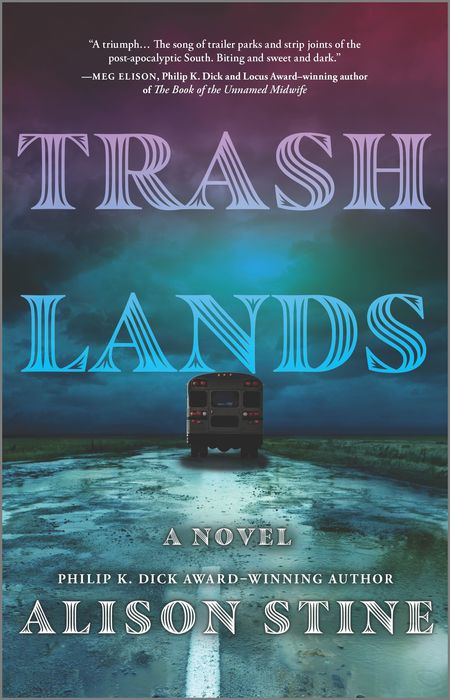Until the COVID pandemic came along and furiously and comprehensively disrupted life as we once knew it, most, if not all, people would have had trouble thinking in terms of a world ruinously different from our own.
As a hypothetical concept, many of us accepted that without actual, substantive action climate change would destroy the earth and our lives as we knew it, but the envisioning of that, the coming to grips with the fact that this could really happen, eluded us until a pandemic showed us how easily the weight of our civilisation can crumble into windblown dust.
It makes the time ripe then for an evocative book like Trashlands by Alison Stine to come along, a story in which, only a few generations hence, our waste and profligacy has left the planet in tatters, its continents redrawn and reshapen, and catastrophic floods sweeping all before them leaving cities a shadow of their former selves and people, where they are still alive, existing very much on the margins.
Into this blighted hellscape in which you would have to assume humanity must be close to throwing in the towel exists a society which, if not vibrant, is tenaciously committed to not giving up on life even if the idea of it is a far cry from what we know now and a shadow of its former glory.
“Coral waded in the water, waist-deep. Her boots only reached her thighs, and when she came home, Trillium would know her damp clothes how deeply she had gone in.
Her pack felt full already, but something bobbed in the river before her. Everything was hot: her body, the river, the air. The setting of the sun would offer little relief, the sky flushed orange and pink. It was brilliant, as was every sunset. Mr. Fall said there used to be a color called Dayglo that would burn so brightly it hurt your eyes. Coral didn’t understand how a color could just disappear. But whole cities could disappear. Coasts could disappear. Trees and flowers and animals.
Children could disappear.” (P. 20)
Here in a smaller, harder, more savage United States, which has all but ceased to be a country, with army and police now the paid protective mechanisms of the rich, life is a hardscrabble thing, one that people hang onto because there is something inbuilt in all of us to never give up even if the odds are firmly stacked against us.
People like Coral and her all-but-husband Trillium – no one has usual names like Andrew or Alison anyway; rather people are called by places and things, almost as if by using those words, the idea of thing stays alive long after their disappearance – and their friends Foxglove, Summer and Coral’s father Mr. Fall, a teacher who guards a tattered incomplete set of Encyclopedia Brittanica with his life, live in a community in what was once southeastern Ohio called Trashlands, which takes its name from the nightclub that sits at its heart.
Ruled like a cruel fiefdom by Rattlesnake Master, who charges for food (always in malnourishing short supply) and food with gouging ruthlessness, Trashlands sits in the vast sprawl of Scrappalachia, once called Appalachia, where plastic, the production of which is banned worldwide, has become high currency, with Trashlands’ down but not out residents, all of whom live in old cars, buses or trucks, devoted to harvesting in what is known as “plucking”.
It is a terrifyingly bleak existence in many respects, with Foxglove and Summer all but prisoners in Trashlands neon-lit 24/7 music embrace, but there is still beauty with Coral taking some of the plastic she finds in the nearby grossly polluted river and making art that she leaves out in the woods for people to find.
She knows they will likely destroy or steal the highly-valuable plastic but she is impelled to take waste and make something worthwhile of it besides recycled goods, something that is beauty for its own sake and which doesn’t exist for purely utilitarian purposes.
Thirtysomething Coral’s artwork is proof that hope is not a spent concept here in a world where by all rights, it should have long been consigned to the dustbin of history.
Her hope is all the more remarkable because she has lost her child to the Dickensian plastic recycling factories, an aching hole that she spends her days working to assuage, hoping that by collecting enough plastic, she can rescue her son from a place into which he was kidnapped seven years earlier and with Trillium and her adoptive father by her side, she can forge some sort of meaningful life.
Rich with humanity and worldbuilding so absolute and real that it springs forth like a known, holdable thing, Trashlands is nowhere near as bleak as you might think it to be.
In amongst the tales of cities besieged by brownouts, brokenness and barely-concealed, and often not then, squalor, brought by journalist Miami who has come ostensibly to write stories about the regions for the paper for which he works but who has a secret quest that he needs Coral to help him with, a vibrancy of hope lives on in defiance of a world working overtime to snuff it out.
“She was the first to the rover. Nothing has washed up on the shore. The tree branches, low to the water, held no plastic bags, tattered as ghosts. It was time to wade in. She checked her boots, hoped the patches would hold. Cold water could kill you. Wet socks could kill you. Sometimes Coral remembered little things from a past she was not even sure was her own. If rabbits get wet, they die. Had she red that, in Mr. Fall’s book?” (P. 219)
What makes reading Trashlands such a pleasurable thing is that while it is brutally honest about the horrific mess we have made of the world and how it could potentially affect future generations, and the medieval darkness of capitalism and greed left to run unfettered, it is also firmly in its belief that there remain things worth fighting for.
It’s not glib or casual about it by any means, with people like Foxglove and Summer forced into virtual slavery to survive (though even they have found sweet moments of connection and love that sustain them) and Trillium, who scavenges ink to do tattoos on strip club visitors and Coral barely scraping by, and it knows any hope is hard won, but nevertheless, it maintains it is not an antiquated idea and worth pursuing, if only because the human spirit is ridiculously tenacious and won’t let go off it even when everything says it should.
A celebration of love, family and belonging where the sheer race to survive should by rights have spun everyone into their own bubble of murderous survivability, Trashlands is a sage warning about present inaction leading to future hellishness, a sobering exploration of a world given over to survival without living, and how despite all this, humanity not only survives but miraculously thrives, and while lessened, is over and done with just yet.

